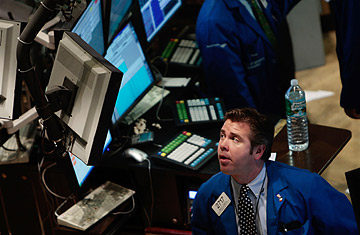
A financial professional looks at a monitor on the floor of the New York Stock Exchange on Oct. 24, 2008, in New York
The Dow fell 312 points on Friday, and every single component of the Dow Industrials lost money. But Friday was, on balance, a good day, given how far markets around the world had fallen while America slept. That's more than fortuitous. It's the global economy's gears at work.
For a bit of perspective, think back on 1997, when a financial crisis began in Thailand and rapidly swept through first Asia and then emerging markets around the world. It brought currency collapses, massive debt defaults and sharp recessions in its wake.
Not that you could really tell in the United States. Sure, there was a bit of a credit-market scare in the latter half of 1998. But on balance, the impact on the U.S. economy was positive — as the emerging market troubles sent commodity prices down and capital flowed to the relative safety of Wall Street. Real GDP grew 4.2% that year.
Now we're in the midst of a financial crisis that grew out of poor lending practices and excessive leverage right here in the U.S.A. Americans will feel the pain: we're surely already in a recession, and there's a good chance that it will get significantly worse. But guess what — the rest of the world may end up suffering as much or even more than we do.
Friday's stock-market action was a microcosm: in Tokyo the Nikkei was down 9.6%; in Frankfurt the DAX — after dropping as much as 10% during the session — was down 5%; in São Paolo the Bovespa was down 6.35%. It was a global panic! Until things got to New York. The Dow and S&P both ended the day down about 3.5%. Big deal.
It doesn't really seem fair, does it? And it isn't fair. But it's what happens when your country's economy is the world's biggest and — more important — your currency is the world's currency. "Imagine how any other country would receive the news that it had been granted the right to discharge its international obligations, as the United States does, in its very own currency, which only it can lawfully print," James Grant writes in the new issue of Foreign Affairs. "There would be dancing in the streets."
As a result, we've been able to partially default on our giant debts to the rest of the world without actually defaulting — thanks to the decline in the dollar over the past five years. Chinese taxpayers, whose government holds a lot of that debt, may end up losing as much or more money (as a share of GDP) on the U.S. financial crisis as taxpayers here will.
A lot of people worried, as the U.S. ran up all those debts in recent years, that the dollar would soon lose its status as the world's reserve currency. But since the financial troubles of the past year turned to panic a few weeks ago, the dollar has been rising against the world's other major currencies. There simply isn't a credible replacement, at least not yet. And until that changes, the U.S. will keep getting to export at least part of its financial woes to the rest of the world. As it did today.
